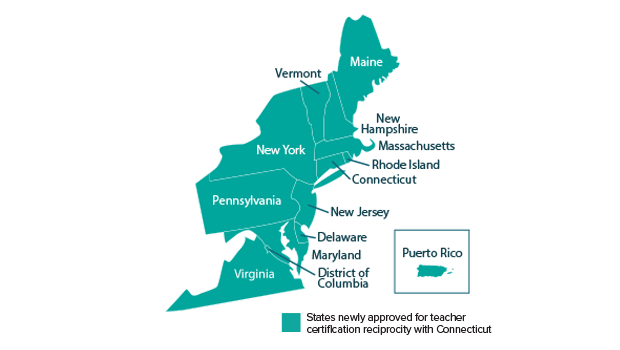Educators who hold a valid, active teaching certificate from several states outside of Connecticut may now apply for and obtain a Connecticut equivalent certification. The Connecticut State Department of Education (SDE) has announced it will recognize teaching certificates from Delaware, the District of Columbia, Maine, Massachusetts, Maryland, New Hampshire, New Jersey, New York, Pennsylvania, Puerto Rico, Rhode Island, Vermont, and Virginia.
SDE Commissioner Charlene Russell-Tucker notes that her agency focused on these states and territories based on their existing certification requirements and extensive data regarding where educators are coming from to work in Connecticut.
“This opens up our ability to hire excellent educators where we have shortages,” says CEA President Kate Dias. “It offers an avenue for growing and diversifying our profession, it makes it easier for students who left Connecticut to come home as teachers, and—importantly—it doesn’t compromise the standards that must be met in order to teach in Connecticut’s public schools. This greater flexibility enables highly qualified teachers from out of state to obtain an equivalent Connecticut certification without having to repeat the certification process. With persistent shortages in our profession, especially since the start of the pandemic, reciprocity can be a valuable recruiting tool.”
CEA Educational Issues Specialist Michele O’Neill notes that because the CSDE is short-staffed, delays in the certification process can be expected. The agency recommends creating an online account or sending in a paper application, and it offers a helpline as well as coaching calls by appointment. Frequently asked questions are answered here. portal.ct.gov/-/media/SDE/Certification/Alerts/EnhancedReciprocity.pdf.
O’Neill also clarifies that no teacher is allowed to teach even a single class outside his or her area of certification.
“This is a fallacy that seems to persist,” she says. “Where instruction is departmentalized, high school teachers are permitted to teach students as young as fifth grade in their subject area, and teachers of world languages can go down to fourth grade,” she explains. “There is also some flexibility within the sciences. But educators are not allowed to teach in grades above those for which they’re certified or in subject areas outside their certification. There are exceptions in place for those who have earned at least 12 credits toward a specific certification and who have obtained a Durational Shortage Area Permit (DSAPs) or completed an application for a Temporary Authorization for a Minor Assignment.”
Temporary Emergency Permits are still in effect and will likely extend at least to the end of the 2022-2023 school year. The decision to apply must be made mutually by the requesting district and the teacher for whom the temporary permit is sought.







